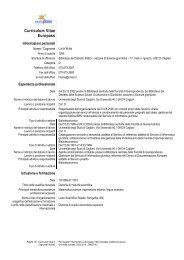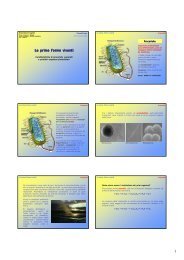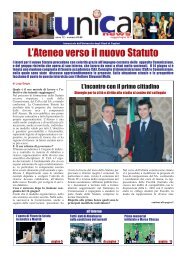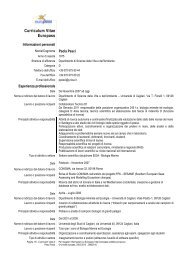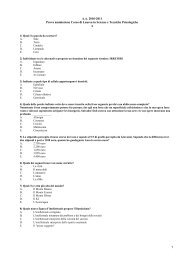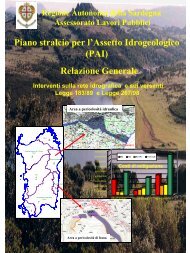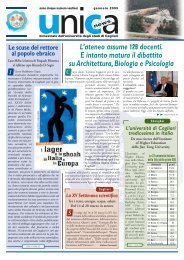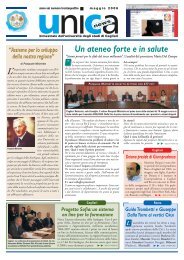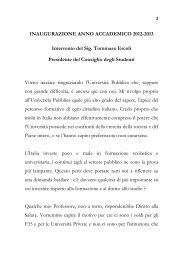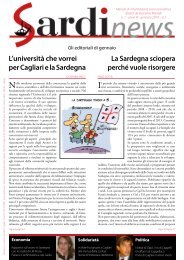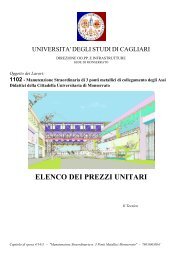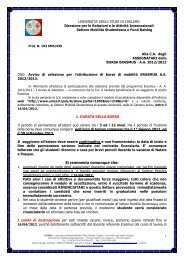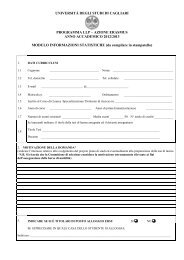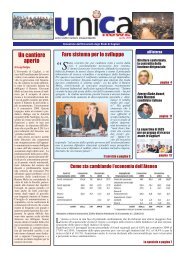Cagliari 6 uniCa - Università degli studi di Cagliari.
Cagliari 6 uniCa - Università degli studi di Cagliari.
Cagliari 6 uniCa - Università degli studi di Cagliari.
Create successful ePaper yourself
Turn your PDF publications into a flip-book with our unique Google optimized e-Paper software.
<strong>Cagliari</strong> 6 <strong>uniCa</strong><br />
University of <strong>Cagliari</strong><br />
International Students’ Guide<br />
2012/2013
<strong>Cagliari</strong> 6 <strong>uniCa</strong> 1<br />
The Chancellor’s welcome<br />
Established in 1606, the University of <strong>Cagliari</strong> is a<br />
public university de<strong>di</strong>cated to offering comprehensive<br />
and unique public education, cutting edge research<br />
and multi-<strong>di</strong>scipline education programmes<br />
for the student community.<br />
These three fundamental and intertwined elements are the foundations<br />
for our mission which provide our students with intellectual vitality<br />
that promises to be our university’s greatest strength.<br />
Thus, the University of <strong>Cagliari</strong> is committed to gui<strong>di</strong>ng and serving<br />
its student community by promoting and furthering their knowledge,<br />
while at the same time buil<strong>di</strong>ng on and learning from past experiences.<br />
High quality teaching is of fundamental importance to our university.<br />
With its 6 faculties, 42 undergraduate, 42 graduate and 35 postgraduate<br />
programmes, the University of <strong>Cagliari</strong>’s main mission is to<br />
provide its students with a high quality education system that will better prepare them for an increasingly<br />
global community.<br />
With about 400 international agreements, our university, together with its undergraduate and graduate<br />
students, actively takes part in an educational process which unites our local culture with Europe and the<br />
rest of the world.<br />
Research and scholarship programmes are important within the University of <strong>Cagliari</strong>’s education system<br />
and to the expansion of our understan<strong>di</strong>ng of the world. Our university actively welcomes and promotes<br />
the deepening of intellectual thought and supports our faculties and students in the furthering of knowledge<br />
and the pursuit of new ideas.<br />
The University of <strong>Cagliari</strong> is committed to sharing the results of its research and development in knowledge<br />
and to improving the social, economic, cultural and intellectual life of <strong>Cagliari</strong> and the region of Sar<strong>di</strong>nia.<br />
Thanks to the exceptional student body, faculties, staff and administrators, our university is able to successfully<br />
carry out its academic mission. It is open to talented people from all backgrounds and values<br />
and it sets out to be an institution based on merit that supports open inquiry, as well as fairness, care and<br />
excellence in all endeavours..<br />
The Chancellor<br />
Prof. Giovanni Melis
2<br />
The University of <strong>Cagliari</strong> and its History<br />
Founded in 1606 as the Stu<strong>di</strong>um Generalis Kalaritanum, the<br />
University of <strong>Cagliari</strong> is based on the old Spanish universities<br />
of Salamanca, Valladolid and Lérida.<br />
The original subjects offered were Law, Latin, Greek and Hebrew<br />
Literature, the Liberal Arts, Me<strong>di</strong>cine, Surgery, Philosophy<br />
and Science. However, during the 18 th century, Sar<strong>di</strong>nia,<br />
under the rule of the House of Savoy government significantly<br />
mo<strong>di</strong>fied the university statute with the expansion of the science<br />
faculties and institutes.<br />
The new university buil<strong>di</strong>ng was designed by the Piedmontese<br />
engineer Saverio Belgrano <strong>di</strong> Farnolasco and was completed<br />
at the end of the 18 th century. Today it holds the Rectorate<br />
and the administrative offices.<br />
The 19 th and 20 th centuries saw a greater emphasis placed<br />
on research activities and the achievement of internationally<br />
acclaimed results.<br />
The University of <strong>Cagliari</strong> and its Present Structure<br />
<strong>Cagliari</strong> 6 <strong>uniCa</strong><br />
The University of <strong>Cagliari</strong> is a public university. It is one of the largest enterprises in the region of Sar<strong>di</strong>nia due to its<br />
international policy and <strong>stu<strong>di</strong></strong>es and its numerous agreements with prestigious universities throughout Europe and<br />
the world.<br />
The university has the following faculties:<br />
� Economics, Law and Political Sciences<br />
� Engineering and Architecture<br />
� Humanities<br />
� Me<strong>di</strong>cine and Surgery<br />
� Pharmacy and Biology<br />
� Sciences<br />
The University of <strong>Cagliari</strong> has four main campuses; they are located both in the town centre and on the outskirts:<br />
� Cittadella <strong>di</strong> Monserrato is situated within 73 hectares and is home to Me<strong>di</strong>cine and Surgery, Physics, Biology and<br />
Natural Sciences, a number of departments and one of the University hospitals;<br />
� The area around Piazza D’armi plays host to the Faculties of Engineering and Humanities;<br />
� Viale Sant’Ignazio comprises the Faculty of Economics, Law and Political Sciences;<br />
� The city centre is home to Architecture in Via Santa Croce, Foreign Languages and Literature in Via San Giorgio<br />
and Mathematics and Pharmacy in Via Ospedale.<br />
There are excellent student facilities close to all campuses inclu<strong>di</strong>ng halls of residence, canteens, libraries, sports<br />
facilities and museums as well as a variety of shops. Furthermore, the city of <strong>Cagliari</strong> offers a wide range of social and<br />
cultural activities, all of which are reasonably priced.
<strong>Cagliari</strong> 6 <strong>uniCa</strong> 3<br />
UNICA in numbers<br />
Faculties 6<br />
Departments 17<br />
Students 31.102<br />
Teaching Staff 1.026<br />
Administrative Staff 1.057<br />
Foreign students 486<br />
Visiting professors 193<br />
The Italian University System<br />
Italy was one of four countries that first engaged in the creation of the so-called “European Area of Higher Education”<br />
(Sorbonne Declaration, May 1998), thus starting the higher education reform known as the “Bologna Process”<br />
(Bologna Declaration, June 1999) that was being implemented all over Europe.<br />
The aim of the Bologna Process was to create a European Higher Education Area (EHEA) based on international cooperation<br />
and academic exchange that was attractive to European students and staff as well as to students and staff<br />
from other parts of the world facilitating their mobility.<br />
The University of <strong>Cagliari</strong> follows the Bologna Process and in accordance with this has adopted a higher education<br />
system based on three levels of study.<br />
Italian University System<br />
• PRIMARY EDUCATION • LOWER SECONDARY EDUCATION • UPPER SECONDARY EDUCATION<br />
BACHELOR 180 ECTS<br />
3 years<br />
MASTERS 120 ECTS<br />
2 years<br />
PhD<br />
SPECIALISATION SCHOOLS<br />
Agreements 398<br />
Bachelor courses 42<br />
Masters courses 36<br />
Combined 6<br />
PhD courses 35<br />
Libraries 26<br />
COMBINED<br />
BACHELOR<br />
AND MASTERS<br />
300/360 ECTS<br />
5/6 years<br />
OTHER QUALIFICATIONS:<br />
- MASTERS 1° LEVEL<br />
- MASTERS 2° LEVEL<br />
A professional Master is a 1 year degree (60 ECTS/120 ECTS) which can be<br />
taken after completing a Bachelor or a two year Master but does not give<br />
access to third level programmes (PhD).
4<br />
<strong>Cagliari</strong> 6 <strong>uniCa</strong><br />
Bachelor Undergraduate <strong>stu<strong>di</strong></strong>es consist of 1 st degree courses<br />
(Laurea - L) which aim to guarantee undergraduate students<br />
have an adequate command of general scientific principles and<br />
mastery of methods.<br />
The general entry requirement is the Italian secondary school<br />
qualification (Diploma <strong>di</strong> Istruzione Secondaria Superiore) which<br />
is awarded for passing the relevant state examination after<br />
completion of 13 years of compulsory schooling. Equivalent foreign<br />
qualifications may be accepted, however, admission to in<strong>di</strong>vidual<br />
degree courses may be subject to specific requirements or<br />
an entrance test.<br />
First degree courses last 3 years and the Laurea (1 st Degree and<br />
Bachelor Level of the Bologna Process) is awarded to undergraduates<br />
who have earned 180 ECTS cre<strong>di</strong>ts. The Laurea <strong>di</strong> primo livello prepares for the world of work and provides<br />
access to degree programmes of the 2 nd level.<br />
Masters Graduate <strong>stu<strong>di</strong></strong>es include the Laurea Magistrale and the Laurea Specialistica.<br />
� The Laurea Magistrale (Master Level of the Bologna Process) aims at provi<strong>di</strong>ng graduates with an advanced level<br />
of education for highly qualified professions in specific sectors. Entry onto the Laurea Magistrale course is allowed<br />
following the completion of the Italian 1 st degree (L) or a comparable foreign degree; admission is subject to specific<br />
course requirements determined by in<strong>di</strong>vidual universities. Workload: 120 ECTS cre<strong>di</strong>ts; length: 2 years. The final<br />
degree is awarded to graduates who have met all curricular requirements and produced an original <strong>di</strong>ssertation.<br />
A limited number of 2 nd level programmes, namely those lea<strong>di</strong>ng to professions regulated by EU <strong>di</strong>rectives in law,<br />
dentistry, me<strong>di</strong>cine, pharmacy are defined as “combined bachelor and masters degree” (Corsi <strong>di</strong> Laurea Magistrale<br />
a ciclo unico). Entry is achieved with the Italian Secondary School leaving <strong>di</strong>ploma or an equivalent foreign<br />
qualification; admission is always subject to entrance exams. Curricula consist of a programme of 5-6 years and<br />
a total number of 300-360 ECTS cre<strong>di</strong>ts.<br />
All Lauree Magistrali grant access to research doctorate programmes as well as to all other degree courses of<br />
the 3 rd level or allow transition into the world of work and regulated professions.<br />
PhD - Specialisation Schools Postgraduate <strong>stu<strong>di</strong></strong>es cover the following types of degree courses: Dottorato <strong>di</strong><br />
Ricerca - CDR (Research Doctorate Programmes, PhDs); Corso <strong>di</strong> Specializzazione - CS (Specialisation Courses).<br />
� A Dottorato <strong>di</strong> Ricerca aims to train postgraduates for advanced scientific research or for professional appointments<br />
of the highest level; they make use of suitable teaching methods such as up-to-date technology, study periods<br />
abroad and internships at specialist research centres. Entry is granted following the completion of a Laurea<br />
Magistrale or an equivalent foreign degree; admission is subject to the passing of very competitive exams. The<br />
course length must be minimum 3 years. It is necessary to write an original <strong>di</strong>ssertation in order to be awarded<br />
this degree: Dottorato <strong>di</strong> Ricerca - DR (Research Doctorate); the correspon<strong>di</strong>ng title is ‘Dottore <strong>di</strong> Ricerca’.<br />
� Specialisation Courses are devised to provide postgraduates with the knowledge and ability to practice highly<br />
qualifying professions; the majority of courses are based in the bio-me<strong>di</strong>cal field. SC were also established<br />
for advanced education and professional training within <strong>di</strong>fferent contexts. They were established in accordance<br />
with specific Italian laws or EU <strong>di</strong>rectives; entry requirements include a Laurea Magistrale or an equivalent foreign<br />
degree and admission is subject to the passing of a competitive entrance examination. The final degree is called<br />
a “Diploma <strong>di</strong> Specializzazione” and gives the title of “Specialista”.
<strong>Cagliari</strong> 6 <strong>uniCa</strong> 5<br />
Other Qualifications<br />
� First level Masters - MU1 consist of advanced scientific courses or higher education <strong>stu<strong>di</strong></strong>es open to those with a<br />
Laurea or a comparable foreign degree; admission may be subject to ad<strong>di</strong>tional con<strong>di</strong>tions. The minimum course<br />
length is 1 year. The degree Master Universitario <strong>di</strong> 1° livello - MU1 (1 st Level University Masters) is awarded to<br />
graduates who have earned at least 60 cre<strong>di</strong>ts. The MU1 does not allow you to follow PhD programmes nor other<br />
3 rd level degree courses.<br />
� Second Level Masters - MU2 consist of advanced scientific courses or higher education <strong>stu<strong>di</strong></strong>es open to those<br />
with a Laurea Magistrale or an equivalent foreign degree; admission may be subject to ad<strong>di</strong>tional con<strong>di</strong>tions.<br />
Stu<strong>di</strong>es last a minimum of 1 year. The degree (Master Universitario <strong>di</strong> 2° livello - MU2) is awarded to postgraduates<br />
who have earned a minimum of 60 cre<strong>di</strong>ts.<br />
Gra<strong>di</strong>ng System, Assessment and Academic Recognition<br />
UNICA has adopted ECTS as an accumulation system. ECTS is a student-centred system based on the student workload<br />
required to achieve the objectives of a programme; objectives defined by learning outcomes and skills that will<br />
be acquired.<br />
The workload refers to the notion<br />
of time that it might take<br />
an average student to complete<br />
the required learning<br />
outcomes.<br />
ECTS are used as recognition<br />
for study periods abroad; 60<br />
cre<strong>di</strong>ts measure the workload<br />
of a full-time student during<br />
one academic year.<br />
The student workload for a<br />
full-time study programme in<br />
Europe amounts in most cases<br />
to 36/40 weeks per year<br />
and 1 cre<strong>di</strong>t is equivalent to<br />
25 - 30 working hours.<br />
Italian Cre<strong>di</strong>t (CFU) = 25 working hours = 1 ECTS cre<strong>di</strong>t<br />
The pass mark for examinations is 18 out of 30.<br />
The highest mark for examinations is 30 out of 30.<br />
An excellent performance is usually graded above 28.<br />
In order to get their degree, students are required to prepare a final <strong>di</strong>ssertation to be <strong>di</strong>scussed in front of a board of<br />
eleven professors who award a final mark no lower than 66 out of 110.<br />
The highest mark is 110 or, for an excellent academic curriculum, 110 cum laude.
6<br />
Academic calendar<br />
Beginning of the Academic Year 01.10.2012<br />
<strong>Cagliari</strong> 6 <strong>uniCa</strong><br />
First Term From 6 th September 2012 to 31 st January 2013<br />
Christmas Break 21 st December 2012 to 7 th January 2013<br />
Examination Period 1 st Term February 2013<br />
Second Term From 14 th February to 15 th June 2013<br />
Easter Break 20 th April to 27 th April 2013<br />
Examination Period 2 nd Term June and July 2013<br />
Summer Holidays 1 st to 31 st August<br />
All Sundays plus these following dates are holidays:<br />
30.10.2012 Feast of San Saturnino (Patron Saint of <strong>Cagliari</strong>)<br />
01.11.2012 All Saints<br />
08.12.2012 Immaculate Conception<br />
25.12.2012 Christmas Day<br />
26.12.2012 Saint Stefano<br />
01.01.2013 New Year’s Day<br />
06.01.2013 Epiphany<br />
31.03.2013 Easter<br />
01.04.2013 Easter Monday<br />
25.04.2013 Anniversary of the Liberation<br />
01.05.2013 Labour Day<br />
02.06.2013 Italian Republic Day<br />
15.08.2013 Ferragosto
THE FACULTIES
8<br />
Faculty of Economics, Law and Political Sciences<br />
Combined Bachelor and masters degree (5 years)<br />
- Law<br />
Bachelor (3 years)<br />
- Economics and business management<br />
- Economics and Finance<br />
- Economics and management of tourist services<br />
- Administration and organization<br />
- Political science<br />
- Juri<strong>di</strong>cal Services<br />
Masters (2 years)<br />
- Managerial Economics<br />
- Economic Sciences<br />
- Governance and the global system<br />
- Politics, land and society<br />
- Administration sciences<br />
Bachelor (3 years)<br />
- Biome<strong>di</strong>cal engineering<br />
- Mechanical Engineering<br />
- Electrical and Electronic Engineering<br />
- Environmental and land Engineering<br />
- Civil Engineering<br />
- Chemical Engineering<br />
- Architectural science<br />
Masters (2 years)<br />
- Chemical Engineering<br />
- Telecommunications Engineering<br />
- Mechanical Engineering<br />
- Environmental and land Engineering<br />
- Energy Engineering<br />
- Electronic Engineering<br />
- Electrical Engineering<br />
- Civil Engineering<br />
- Architecture<br />
Faculty of Engineering and Architecture<br />
<strong>Cagliari</strong> 6 <strong>uniCa</strong>
<strong>Cagliari</strong> 6 <strong>uniCa</strong> 9<br />
Faculty of Humanities<br />
Combined Bachelor and masters degree (4 years)<br />
- Primary education<br />
Bachelor (3 years)<br />
- Humanities<br />
- Philosophy<br />
- Cultural Heritage<br />
- Languages and communication<br />
- Languages for Language Me<strong>di</strong>ation<br />
- Education science<br />
- Psychology<br />
- Communication <strong>stu<strong>di</strong></strong>es<br />
Masters (2 years)<br />
- History and society<br />
- Philosophical and historical-philosophical sciences<br />
- Archaeology and art history<br />
- Classic and modern literature and philology<br />
- Languages for communication and international cooperation<br />
- Modern European and American languages and literature<br />
- Specialist text translation<br />
- Pedagogical and educational services sciences<br />
- Psychology of development and social and work-related processes<br />
Faculty of Me<strong>di</strong>cine and Surgery<br />
Combined Bachelor and masters degree (5 years)<br />
- Me<strong>di</strong>cine and surgery<br />
- Dentistry and orthodontics<br />
Bachelor (3 years)<br />
- Nursing<br />
- Obstetrics<br />
- Biome<strong>di</strong>cal laboratory techniques<br />
- Oral hygiene<br />
- Logope<strong>di</strong>cs<br />
- Me<strong>di</strong>cal assistance<br />
- Techniques in psychiatric rehabilitation<br />
- Physical activity and sport sciences
10<br />
Masters (2 years)<br />
- Nursing and obstetrics<br />
- Sciences and techniques in preventive and adaptive physical activities<br />
Faculty of Pharmacy and Biology<br />
Combined Bachelor and masters degree (5 years)<br />
- Chemistry and Pharmaceutical Technology<br />
Bachelor (3 years)<br />
- Toxicology<br />
- Industrial Biotechnology<br />
- Biology<br />
- Natural Sciences<br />
Masters (2 years)<br />
- Pharmacy<br />
- Food and Nutrition Sciences<br />
- Cellular and molecular biology<br />
- Neuropsychobiology<br />
- Natural sciences<br />
- Marine bio-ecology<br />
Bachelor (3 years)<br />
- Chemistry<br />
- Physics<br />
- Computer Science<br />
- Geology<br />
- Mathematics<br />
Masters (2 years)<br />
- Computer science<br />
- Mathematics<br />
- Chemical sciences<br />
- Physics<br />
- Geological sciences and technologies<br />
Faculty of Sciences<br />
<strong>Cagliari</strong> 6 <strong>uniCa</strong>
<strong>Cagliari</strong> 6 <strong>uniCa</strong> 11<br />
List of PhD schools available at UNICA<br />
� PhD school in BIOLOGY AND HUMAN AND ENVIRONMENT BIOCHEMISTRY<br />
Director: Prof. Angelo Cau - Website: http://people.unica.it/bbua/<br />
� PhD school in PHILOSOPHY AND EPISTEMOLOGY<br />
Director: Roberto Giuntini - giuntini@unica.it<br />
� PhD school in PHYSICS<br />
Director: Prof. Giovanni Bongiovanni - Website: http://dottorato.dsf.unica.it/<br />
� PhD school in CIVIL ENGINEERING AND ARCHITECTURE<br />
Director: Prof. Gaetano Ranieri - Website: http://people.unica.it/scudo/la-scuola/<br />
� PhD school in INFORMATION ENGINEERING<br />
Director: Prof. Alessandro Giua - Website: http://www.<strong>di</strong>ee.unica.it/DRIEI<br />
� PhD school in ENVIRONMENTAL AND LAND ENGINEERING AND SCIENCES<br />
Director: Prof. Alessandra Carucci - Website: http://people.unica.it/scuola<strong>di</strong>sat<br />
� PhD school in INDUSTRIAL ENGINEERING<br />
Director: Prof. Alessandra Fanni - Website: http://www.<strong>di</strong>ee.unica.it/s<strong>di</strong>nin/<br />
� PhD school in NEUROSCIENCES AND MORPHOLOGICAL SCIENCES<br />
Director: Prof. Paola Sirigu - psirigu@unica.it<br />
� PhD school in CHEMICAL AND PHARMACEUTICAL SCIENCES AND TECHNOLOGIES<br />
Director: Prof. Anna Corrias - http://unica2.unica.it/~corrias/ANNA/Anna%20Corrias.htm<br />
� PhD school in MANAGEMENT AND ACCOUNTING<br />
Director: Prof. Aldo Pavan - email: apavan@unica.it<br />
� PhD school in LAW SCIENCES<br />
Director: Prof. Giancarlo Filanti - http://giurisprudenza.unica.it/pub/docenti/<br />
� PhD school in MATHEMATICS AND INFORMATICS<br />
Director: Prof. Marco Gaviano - Website: http://phdmi.sc.unica.it/<br />
� PhD school of HISTORICAL, POLITICAL, GEOGRAPHICAL AND GEOPOLITICAL SCIENCES<br />
Director: Prof. Gianfranco Tore ; toreg@unica.it<br />
� PhD school in PHILOLOGICAL AND LITERARY STUDIES<br />
Director: Prof. M. Cristina Lavinio - Website: http://www.unica.it/filolog/dottorato.htm<br />
� PhD school in TOXICOLOGY<br />
Director: Prof. Gaetano Di Chiara - Website: www.phdtoxicology.it<br />
Info at: http://www.unica.it/pub/3/index.jsp?is=3&iso=47 ; email: dottoratiemaster@unica.it
12<br />
On your arrival<br />
The International Student Mobility Office Karalis - ISMOKA<br />
<strong>Cagliari</strong> 6 <strong>uniCa</strong><br />
By statute, the International Mobility Office acts as the General Administration Office. This is the office foreign students<br />
must contact on their arrival in <strong>Cagliari</strong>.<br />
ISMOKA supplies foreign students with all necessary help and information; it is responsible for the documentation<br />
required for scholarships, the issuing of certificates, helping students find suitable accommodation, organising Italian<br />
language courses and forms a link between the academic tutor and the student.<br />
On arrival in <strong>Cagliari</strong>, foreign students must bring the following documents to this office:<br />
1. Passport or Identity card;<br />
2. A certificate from their university stating that they have been awarded an exchange scholarship;<br />
3. Three passport-size photographs which will be used for issuing the student’s record book in which all courses<br />
taken during the student’s stay at the university as exchange students will be recorded;<br />
4. The “European Health Insurance Card” or an equivalent insurance policy covering the entire period of stay at the<br />
University of <strong>Cagliari</strong>.<br />
The International Office will provide foreign students with an information pack and a certificate of attendance declaring<br />
their International Exchange Student status at the University of <strong>Cagliari</strong>.<br />
Within 7 days of arrival, students should inform the International Office of their address and telephone number in <strong>Cagliari</strong>.<br />
All duly registered temporary students receive a “University of <strong>Cagliari</strong> fidelity card” which allows them to evaluate the<br />
quality of their stay at the university and in town.
<strong>Cagliari</strong> 6 <strong>uniCa</strong> 13<br />
Students that are not participating in an exchange programme and that wish to study at the University of <strong>Cagliari</strong> must<br />
register via the admission office at the chosen faculty.<br />
The person responsible for the International Office is the Rector’s delegate for foreign relations, Prof. Giovanna Maria<br />
Ledda, aided by the administrative personnel. The person in charge is Mrs. Anna Maria Aloi duly supported in international<br />
activities by her assistants: Vanessa Carboni, Stefania Melas and Maria Giuseppina Ullu.<br />
THE ISMOKA - (INTERNATIONAL STUDENTS MOBILITY OFFICE KARALIS)<br />
Campus Aresu - Via San Giorgio n. 12 - Ingresso 2 - 09124 <strong>Cagliari</strong> - Italy<br />
Tel: +39 070 675 6533 - 6536 - 6539 - 6540 - 6541<br />
Fax: +39 070 675 6543<br />
Email: erasmus@unica.it Web site: http://www.unica.it/pub/6/index.jsp?is=6&iso=218<br />
Opening Hours for Foreign Students<br />
Monday to Friday: 9.00 - 13.00<br />
Residence Permit<br />
Students coming from an EU country<br />
do not need a residence permit in<br />
order to stay in Italy. However, if the<br />
study period exceeds three months<br />
they must apply to the local “CO-<br />
MUNE” (Town Hall) for residency.<br />
All non-European students must apply<br />
for a residence permit using the<br />
pack available from the Post Office.<br />
How to apply:<br />
1. Go to a Post Office (you can ask the<br />
ISMOKA staff for information) and<br />
take the pack with a yellow stripe;<br />
2. Fill in Form 1 thoroughly;<br />
3. Pay € 107.50 to the Post Office<br />
using the appropriate postal payment slip. This sum is required in order to issue the residence permit which lasts<br />
for between 8 and 12 months;<br />
4. Put all the required documents: Form 1, a € 14.62 revenue stamp, an A4 copy of your ID, the receipt of payment<br />
of € 27.50 and all other necessary documents in an envelope, but DO NOT close it;<br />
5. Return the envelope to the Post Office and pay a € 30 delivery charge;<br />
6. The post office will give you a receipt with the user ID and password needed to check the status of your application,<br />
keep it in a safe place until the application has gone through;<br />
7. You will receive a letter from the Post Office asking you to go to the Police Headquarters (Questura) to have your<br />
fingerprints taken;<br />
8. Finally, you will be called back to receive your residence permit.<br />
If your documents are lost or stolen you should contact the Questura (Police) or Carabinieri in your <strong>di</strong>strict.<br />
More information can be found at the following web site: http://www.polizia<strong>di</strong>stato.it/articolo/10617
14<br />
Insurance<br />
<strong>Cagliari</strong> 6 <strong>uniCa</strong><br />
Students must take out insurance against accidents covering the duration of their stay in <strong>Cagliari</strong>. The policy covers<br />
any accident that might occur during <strong>di</strong>dactic activities.<br />
Students must pay about 6 € for accident insurance at the Banco <strong>di</strong> Sardegna (Monday to Friday 8:20 to 13:20 and<br />
15:00 to 16:30) to the University of <strong>Cagliari</strong> bank account number 43280, IBAN: IT51T0101504800000000043280.<br />
The reasons of payment must be specified as ‘contributo per la mobilità internazionale - spese assicurative’.<br />
Me<strong>di</strong>cal Assistance<br />
� EU students must have a European Health Insurance Card (EHIC) or a temporary certificate as a substitute for<br />
the card. This entitles them to the right to access me<strong>di</strong>cal assistance provided by the National Health Service.<br />
Students who do not have the above mentioned documents have to go to the NHS offices located in Via Romagna<br />
16, <strong>Cagliari</strong>, at the Ufficio Rapporti Internazionali, tel: 070 47443689,<br />
email: rapportiinternazionali.ca@asl8cagliari.it, opening days: Monday - Friday 8:30 -12:30 am,<br />
Tuesday 15:30 -17:00 and ask for the necessary documents to access the NHS.<br />
� Non EU students must take out private health insurance in their home country when applying for a visa. The<br />
insurance must cover all expenses in the event of emergency treatment or urgent hospitalisation; it must cover<br />
the entire duration of the student’s stay in Italy. It must also guarantee the policy-holder’s return to their home<br />
country in case of serious illness. It must be translated in Italian and legalised by the Italian embassy.<br />
Non-EU students can enrol with the Italian National Health Service instead of taking out private insurance. In order<br />
to do so, students need the following documents:<br />
- Identity document<br />
- Residence Permit or other document released by the Questura (Italian Police) proving that they are in<br />
Italy for study reasons;<br />
- Document from the university certifying that they are studying at the University of <strong>Cagliari</strong>;<br />
- Tax code; (www1.agenziaentrate.gov.it/inglese)<br />
- Receipt of payment of € 149.77 (NB: the payment provides cover only until the 31 st December of the<br />
current year and terminates with the expiration of the residence permit).<br />
The sum of 149.77 € must be paid at the Post Office to the account number C/C n. 490094, intestato a: RE-<br />
GIONE AUTONOMA DELLA SARDEGNA with the reason (causale): ‘contributo SSN <strong>Cagliari</strong>’.<br />
All the required documents must be brought to the Ufficio Rapporti Internazionali located in Via Romagna 16,<br />
<strong>Cagliari</strong>, tel: 070 47443689, opening hours: Monday - Friday 08.30 -12.30 am, Tuesday 15.30 -17.00.<br />
The ISMOKA office will help students with the procedure.<br />
Please note that it is the student’s responsibility to check with the Italian Embassy or Consulate and Health Institutions<br />
in their country as to whether or not they are entitled to free health cover.<br />
Students with Special Needs<br />
We welcome applications from students with <strong>di</strong>sabilities. The adviser for <strong>di</strong>sabled students runs a comprehensive<br />
service dealing with issues inclu<strong>di</strong>ng admission arrangements, personal support, learning support, advice on equipment<br />
purchase and special exam arrangements.<br />
The university has introduced the following services in order to allow the students to participate in all the aspects of<br />
university life:
<strong>Cagliari</strong> 6 <strong>uniCa</strong> 15<br />
� Tutor Service for the assistance and the integration of <strong>di</strong>sabled students;<br />
� Agreement with the Institute of the Blind which includes the organisation of computer-literacy courses for which<br />
the university provides computing facilities, free loan, a Braille printer and a maximising photocopier;<br />
� Interpreting Service for hearing-impaired students;<br />
� Supply of specific equipment and aids;<br />
� Service of note taking in some faculties for students with sensorial <strong>di</strong>sabilities;<br />
� Transport Service with equipped minibus and guide for students with sensorial and physical <strong>di</strong>sabilities.<br />
The above mentioned services are also offered to graduate students who attend specialisation courses, research<br />
doctorates, masters degrees and anything related to postgraduate study.<br />
� Consultancy and orientation service to support upper secondary school students entering university;<br />
� Guidance and assistance for selective examinations for the admission to degree courses with limited access;<br />
� Interme<strong>di</strong>ation with the teachers in order to in<strong>di</strong>vidualise exams;<br />
� Guidance and assistance during exams to students with sensorial and physical <strong>di</strong>sabilities;<br />
� Collection of bibliographical and teaching material;<br />
� Bureaucratic and administrative procedures (enrolment application forms, payment of fee, etc.);<br />
� Information on the study programme, on lesson timetables and exam dates;<br />
� Activation of book loans with a special card in accordance with the library <strong>di</strong>rectors;<br />
� Reporting and resolving of parking problems;<br />
� Reporting architectural barriers in the university buil<strong>di</strong>ngs to reduce and eliminate them;<br />
� Contact and collaboration with the Institute of the Blind;<br />
� Reserved places in class.<br />
For further information visit the following website: http://www.unica.it/~<strong>di</strong>sabilita/index.html<br />
Ufficio Disabilità<br />
Via San Giorgio 12 - 09124 <strong>Cagliari</strong> - Tel: +39 070 675 6221 - Email: ufficio.cas@amm.unica.it
16<br />
Sports Activities<br />
<strong>Cagliari</strong> 6 <strong>uniCa</strong><br />
There are a number of gyms in <strong>Cagliari</strong> offering a variety<br />
of sports activities from body buil<strong>di</strong>ng to dance, from<br />
volleyball to swimming; just look around for the one<br />
closest to you.<br />
If you enjoy football <strong>Cagliari</strong> is the place to be as it plays<br />
host to some of the most famous football clubs in Italy<br />
as <strong>Cagliari</strong> Football Club plays in the Campionato Serie<br />
A, the major league in Italy.<br />
The University of <strong>Cagliari</strong> also has a sports centre: the<br />
C.U.S. or Centro Universitario Sportivo (University Sports<br />
Centre). The sports facilities are located in two parts of<br />
<strong>Cagliari</strong>:<br />
• Via Is Mirrionis 3 - 09123 <strong>Cagliari</strong><br />
• Cittadella Universitaria S.S. 554 Km 4.500 - 09042 Monserrato<br />
To access the CUS sports complexes students need a card which can be obtained after registration at the CUS<br />
admissions office:<br />
Segreteria C.U.S. Via Is Mirrionis 3, <strong>Cagliari</strong> - Office Opening Hours: Monday to Friday 9:00 -12:00 and Monday to<br />
Wednesday 16:00 - 18:00 - Tel: 070 283816 - Fax: 070 283764<br />
Foreign students must bring the certificate given to them by the Ismoka Office, a valid identity document and about 2.50 €.<br />
The card is valid throughout the entire academic year.<br />
At the CUS complexes students can practice both in<strong>di</strong>vidual and team sports. Leagues and tournaments are organised annually<br />
and courses are available on payment of a fee.<br />
Opening Hours for Sports Facilities: Monday to Friday 7-13 / 14-22* - Saturday 7-12 / 14-19* - Sunday 8-12*<br />
* Opening hours may be subject to change. Contact the office for more information.<br />
The University Language Centre<br />
Our University Language Centre (CLA) is a service which aims to teach foreign languages to university students,<br />
European programmes, international exchange students, students with scholarships, specialising students, contract<br />
workers, PhD students, university researchers, teachers, administrative personnel and the general public.<br />
The centre organises courses in: Arabic, Catalan, Chinese, English, French, German, Japanese, Portuguese, Russian,<br />
Spanish, Turkish, and Italian as a foreign language.<br />
The courses are held by professional teachers, native speakers of the language, who use advanced technology in<br />
order to develop the students’ skills further; this includes au<strong>di</strong>o, video, computing materials, au<strong>di</strong>o-active laboratories<br />
and a multime<strong>di</strong>a laboratory with self-learning facilities.<br />
The courses are organised into <strong>di</strong>fferent programmes and based on various levels:<br />
� Absolute beginners<br />
� Elementary I-II<br />
� Pre-interme<strong>di</strong>ate I-II<br />
� Interme<strong>di</strong>ate I-II<br />
� Upper-interme<strong>di</strong>ate I-II<br />
� Advanced I-II
<strong>Cagliari</strong> 6 <strong>uniCa</strong> 17<br />
The CLA is a testing site for the TOEFL<br />
exam in English and the DELF/DALF<br />
in French.<br />
Since lectures, seminars and tutorials<br />
are held almost exclusively in Italian,<br />
it is advisable for foreign students to<br />
arrive at the university with a basic<br />
knowledge of the Italian language.<br />
During October and March the University<br />
Language Centre organises<br />
three intensive 60-hour Italian courses<br />
(Elementary, Interme<strong>di</strong>ate and Advanced) with classroom lectures and extensive tutorials in a modern language<br />
laboratory. Each course counts for 6 cre<strong>di</strong>ts. These courses are in<strong>di</strong>spensable for successful progress in the chosen<br />
<strong>stu<strong>di</strong></strong>es. Students planning to attend our university are thus kindly requested to let ISMOKA know whether they wish<br />
to attend one of the courses by the 31 st August for the course held in October or the 31 st December for the course<br />
held in March.<br />
The University Language Centre - C.L.A. - Viale S. Vincenzo 57 - 09123 <strong>Cagliari</strong><br />
Switchboard tel. 070 675 7183 - Tel. 070 675 7390-91-92 - 070 675 7396-97 - Fax 070 273131<br />
Opening hours: Monday to Friday 9:00-12:00; Thursday: 15:00-17:00<br />
Website: http://cla.unica.it email: labor@unica.it<br />
Libraries at UNICA<br />
The University Library was founded in 1792. With a collection of hundreds of manuscripts, thousands of autograph<br />
letters and a rich collection of works of the XVI and XVII centuries and its beautiful XVII century hall the Library is one<br />
of the most important of the island.<br />
It is located in 32, Via <strong>Università</strong>;<br />
Phone number: 0039 070 661021.<br />
All Faculties, Institutions and Departments<br />
of this University have their<br />
own libraries, where students can<br />
find publications, books, reviews and<br />
microfilms on specific subjects.<br />
Information on opening times can be<br />
obtained from the respective Faculties,<br />
Institutions and Departments or<br />
in the website at http://sba.unica.it
18<br />
Italian Language and Culture courses<br />
<strong>Cagliari</strong> 6 <strong>uniCa</strong><br />
The University of <strong>Cagliari</strong> each year organises Italian language courses that focus on grammar as well as Sar<strong>di</strong>nian<br />
cuisine and Sar<strong>di</strong>nian tra<strong>di</strong>tion. The three courses in total last 60 hours; the language courses are available for the<br />
following levels: A1, A2, B1, B2 and C1. These language courses are organised by ISMOKA in collaboration with the<br />
CLA (Centro Linguistico d’Ateneo). The teaching programmes are aimed at developing rea<strong>di</strong>ng, writing, listening and<br />
speaking skills in terms of grammar, phonetics and vocabulary. Throughout the summer four courses are available<br />
each lasting 2 weeks. Students who successfully complete the course will be given a certificate stating the level<br />
achieved accor<strong>di</strong>ng to the Common European Framework of Reference for Languages (CEFRL). The total cost of the<br />
programme is € 150, however, Erasmus students, foreign scholarship holders, PhD students and guest researchers<br />
will receive a 20% <strong>di</strong>scount on the course cost. <strong>Cagliari</strong> itself offers a wide range of accommodation, for example<br />
hotels, B&B’s, hostels and private apartments.
<strong>Cagliari</strong> 6 <strong>uniCa</strong> 19<br />
Computing Facilities<br />
Students can take advantage of the wireless internet connection within the university buil<strong>di</strong>ngs and spaces. A WIFI<br />
account can be requested at the ISMOKA office; students will be assigned a personal account with a password and<br />
user ID within a few days. Otherwise students can ask for their user ID and password at the UNICA-DRSI offices<br />
located in Via Marengo 3, <strong>Cagliari</strong> on Monday and Thursday 11.30 - 18.30, Tuesday and Wednesday 9 -16, Friday<br />
11.30 - 15.30; tel: 070 675 5020.<br />
When students receive their user ID and password, they must agree to the following rules:<br />
1. It is forbidden to use UniCAMente WIFI for anything other than academic purposes;<br />
2. It is forbidden to give or sell one’s user ID or password to anyone;<br />
3. Subscribers must strictly follow GARR AUP rules<br />
(www.garr.it/reteGARR/aup.php?idmenu=collegare);<br />
4. Unica netiquette rules must be followed strictly<br />
(http://people.unica.it/settoreposta/files/2006/12/netiquette.txt);<br />
5. It is forbidden to download files bigger than 1 MB;<br />
6. It is forbidden to download files that violate copyright laws;<br />
7. It is forbidden to use p2p or file sharing programmes while connected to UniCAMente.<br />
Any violation of the above mentioned rules and any abuse or misuse of user ID and password will lead to the removal<br />
of the WIFI connection and to legal action.<br />
The University of <strong>Cagliari</strong> guarantees the absolute confidentiality of the user IDs and passwords, these will not be<br />
revealed to anyone except law authorities who may be notified about crimes committed via the connection provided.<br />
There are many other internet points and cafés in town that you can use, but you may have to pay a few Euros per hour.
20<br />
ESN - Exchange Students’ Association<br />
<strong>Cagliari</strong> 6 <strong>uniCa</strong><br />
There are many international student associations. Among these, ESN <strong>Cagliari</strong> cooperates with ISMOKA.<br />
To get in touch with ESN contact the ISMOKA office or http://esncagliari.it, www.facebook/esncagliari<br />
You may also find student representatives within the faculties and central administration ready to help and advise you<br />
and who will vigorously defend students’ interests. The tasks within the associations include:<br />
� Receiving foreign students on arrival;<br />
� Helping visiting students feel at home;<br />
� Assisting foreign students in fin<strong>di</strong>ng accommodation;<br />
� Giving advice on academic problems;<br />
� Organising social and cultural entertainment for students.<br />
Here is a list of other student associations for international students:<br />
AEGEE <strong>Cagliari</strong>: www.aegeecagliari.com<br />
Elsa <strong>Cagliari</strong> http://www.elsacagliari.it/<br />
ISAWO http://www.isawo.it/<br />
TDM 2000 http://www.tdm2000.org//<br />
Accommodation<br />
On your arrival in <strong>Cagliari</strong> you will need to find accommodation. Here are some websites that might help you in your<br />
search:<br />
www.easystanza.it<br />
http://stanze.trova-casa.net<br />
http://cagliari.bakeca.it<br />
http://www.sportellocasacagliari.it<br />
You can also buy ‘Il Baratto’ a newspaper<br />
of advertisements for 1.50 €. If you are<br />
still having problems fin<strong>di</strong>ng a place to<br />
stay you can ask the ESN staff for help.<br />
For temporary accommodation, we advise<br />
students to look for hostels or B&Bs,<br />
this is the cheapest accommodation<br />
available. Information and contact numbers<br />
can be easily found on the internet. However, if you prefer something more comfortable with greater services you<br />
can find a wide range of hotels of all categories in and around town.
<strong>Cagliari</strong> 6 <strong>uniCa</strong> 21<br />
The Regional Agency for the Right to Higher Education - ERSU<br />
ERSU is the Regional Agency for the Right to Higher Education. Its function is to cooperate with the regional government<br />
and the university to promote higher education, accessibility to university courses and by way of economic<br />
support and orientation activities promote the achievement of high degrees of professionalism for deserving students.<br />
Students need an ERSU card to benefit from some of the university services, such as the canteen service. To get a<br />
card they have to go to the ERSU office in Corso Vittorio Emanuele II, 68 - <strong>Cagliari</strong>. Since the process is particularly<br />
<strong>di</strong>fficult for foreign students you can ask ISMOKA staff for help.<br />
The card is valid for one year and gives you the right to access the canteens, the agency’s library in Via Trentino as<br />
well as cultural, sports and recreational services.<br />
Moreover, ERSU offers its rooms to Erasmus students, PhD students, trainees and visiting professors to the University<br />
of <strong>Cagliari</strong>. The application must be sent to the university well in advance before the start of the academic year to allow<br />
scheduling of arrivals and booking of rooms. Since the number of rooms for foreign students and visitors is limited,<br />
assignment of rooms is subject to availability.<br />
Once you have your ERSU card you<br />
can go to a canteen (there are several<br />
canteens throughout <strong>Cagliari</strong>), top up<br />
your card and then you can access<br />
the canteen for your meal. With a<br />
subscription you can buy 10 meals at<br />
2.50 € each or you can buy a single<br />
meal occasionally for 3.50 €.<br />
Canteens are located in:<br />
� Via Premuda, 10 - <strong>Cagliari</strong><br />
� Piazza Michelangelo - <strong>Cagliari</strong><br />
� Via Trentino, 15 - <strong>Cagliari</strong><br />
� Cittadella Universitaria - Monserrato<br />
Canteen Service<br />
Meals are served from 12.00 to 14.30 and from 19.15 to 21.00.<br />
The service is available Monday to Saturday. Only the canteen in Via Trentino opens every day, Sundays and public<br />
holidays included.
22<br />
Bank Account<br />
<strong>Cagliari</strong> 6 <strong>uniCa</strong><br />
The easiest way to transfer money is by opening a bank account. To open an account in Italy the following documents<br />
are required:<br />
� Certificate of enrolment to a university or certificate of attendance of a university course;<br />
� Identity document;<br />
� Tax code (see below).<br />
It is possible to choose between a<br />
wide variety of banks or a post office:<br />
post offices offer the same services as<br />
banks.<br />
There are two main types of account:<br />
current account (conto corrente) or<br />
deposit account (libretto <strong>di</strong> risparmio).<br />
A ‘libretto <strong>di</strong> risparmio’ is just used to<br />
store money, you can pay any sum<br />
of money into your bank account. A<br />
‘conto corrente’ is more flexible and<br />
on request you can obtain a debit card<br />
(bancomat), a cre<strong>di</strong>t card and a home<br />
banking service. We advise you to ask<br />
more than one bank to find the most<br />
suitable.<br />
In case of loss or theft of your cre<strong>di</strong>t or debit card you should block it imme<strong>di</strong>ately to avoid loss of money. Calls are<br />
free but you must check which number you need as there are <strong>di</strong>fferent numbers for each card. Take note of what the<br />
operator says. After having blocked your card you should go to the nearest police headquarters to report the theft.<br />
Tax Code (Co<strong>di</strong>ce Fiscale)<br />
The Co<strong>di</strong>ce Fiscale is a personal code used for tax purposes. In Italy it is required in order to access a large number of<br />
services such as opening a bank account or obtaining an insurance policy. To get your Co<strong>di</strong>ce Fiscale you have to go<br />
to a Revenue and Customs Office: Via Cesare Pintus, <strong>Cagliari</strong> and contact Mario Vir<strong>di</strong>s Tel. 070 5508426.<br />
Money<br />
The official currency in Italy is the Euro (€): 1 euro is <strong>di</strong>vided into one hundred cents (100 centesimi).<br />
The coins issued are 1 centesimo, 2, 5, 10, 20, 50 centesimi, 1 euro and 2 euro. The notes issued are 5, 10, 20,<br />
50, 100, 200, 500 Euro. The Euro can be used throughout the sixteen countries in the Euro zone: Austria, Belgium,<br />
Cyprus, Finland, France, Germany, Greece, Ireland, Italy, Luxembourg, Malta, Netherlands, Portugal, Slovakia, Slovenia<br />
and Spain.<br />
Be careful when you accept coins, check that they are Euros rather than other currencies not accepted in Italy.
<strong>Cagliari</strong> 6 <strong>uniCa</strong> 23<br />
Shops are generally closed on Sundays<br />
but most are usually open Monday<br />
- Saturday 9.00 - 13 and 17.00<br />
- 20.30. Supermarkets and shopping<br />
centres are open on Sundays too.<br />
Restaurants open almost every day<br />
and close one day a week. Usually,<br />
opening hours are written on the door<br />
but are generally open between 12.30<br />
- 14.30 and 19.30 - 23.30. Tipping<br />
is not expected but for helpful staff it<br />
may be nice to leave a tip.<br />
Post Offices open Monday - Saturday<br />
8.00 - 13.00; the main post offices<br />
open Monday - Friday 8.00 - 18.50<br />
and Saturday 8.00 - 13.00.<br />
Banks open Monday - Friday 8.00 - 13<br />
and 15.00 - 16.30.<br />
Shopping and Services<br />
Public transport<br />
Plane<br />
The easiest and quickest way for foreigners to reach <strong>Cagliari</strong> is by plane. The nearest airport is <strong>Cagliari</strong>-Elmas<br />
located 6km from the city.<br />
Companies such as Ryanair, Easyjet, Meri<strong>di</strong>ana, British Airways, Air Berlin, Lufthansa etc. fly to <strong>Cagliari</strong> and link the<br />
city with other major Italian cities (Rome, Florence, Venice, etc.) as well as other European countries.<br />
http://www.aeroporto<strong>di</strong>cagliari.com<br />
Buses between <strong>Cagliari</strong> and the airport are available every 30 minutes (or one every hour before 9am):<br />
<strong>Cagliari</strong> (Arst bus station, Piazza Matteotti) - Airport from 5.20 am to 22.30<br />
Airport - <strong>Cagliari</strong> (Arst bus station, Piazza Matteotti) from 7.25 am to 00.30.<br />
Journey time is 10 minutes and a single ticket costs 2 €.<br />
For more info www.arst.sardegna.it or tel. 800865042.<br />
Taxis are also available from the airport as well as in town.
24<br />
<strong>Cagliari</strong> 6 <strong>uniCa</strong><br />
Other airports in Sar<strong>di</strong>nia include Olbia airport and Alghero airport both of which are located in the north of the<br />
island. These are some hundreds of kilometres away from <strong>Cagliari</strong>.<br />
http://www.aeroporto<strong>di</strong>olbia.com - http://www.aeroporto<strong>di</strong>alghero.it<br />
However, some bus companies connect these airports to <strong>Cagliari</strong> and vice versa for about 20 €. For more info check<br />
these websites:<br />
For Alghero www.logudorotours.it - Tel: (+39) 079 281728<br />
For Olbia www.turmotravel.it/orari/orari_cagliari_steresa.htm - Tel: +39 789 21487<br />
Ferry<br />
Several companies connect Sar<strong>di</strong>nia to Italy (Civitavecchia-Rome, Piombino and Livorno in Tuscany, Trapani and<br />
Palermo in Sicily, Naples, Geneva) and Europe (Barcellona, Marseille, Bonifacio and Propriano in Corsica), such as<br />
Gran<strong>di</strong> Navi Veloci, Moby Lines, Sar<strong>di</strong>nia Ferries, Corsica Ferries, Grimal<strong>di</strong> Lines, Snav, Tirrenia, CMN La Méri<strong>di</strong>onale.<br />
The nearest port is that of <strong>Cagliari</strong> which is connected by Tirrenia.<br />
Rail<br />
A cheap way to travel around Sar<strong>di</strong>nia is by train. The train station in <strong>Cagliari</strong> is located in Piazza Matteotti. You can<br />
find more information on destinations, timetables and prices on the following websites www.ferroviedellostato.it and<br />
www.ferroviesardegna.it<br />
Buses<br />
The main public bus company in Sar<strong>di</strong>nia is ARST, this connects all parts of the island. For timetables and more info<br />
visit www.arst.sardegna.it .<br />
If you want to visit Sar<strong>di</strong>nia while you are here (which we advise you to do) an alternative to trains is bus transport,<br />
this is slightly more expensive but links places not connected by trains.<br />
In ad<strong>di</strong>tion to the public bus service you can find a number of tour companies available; check the internet for more<br />
info.<br />
The bus service in town is operated by CTM. The service is available 365 days a year however, on Sundays and public<br />
holidays there are fewer buses and timetables may be altered. Buses run from 4am to 00.50. You can buy single or<br />
return tickets at kiosks, bars or tabacchi or buy a <strong>di</strong>scount card (if you are aged 26 or under) by applying to the CTM<br />
office Viale Trieste 159/3 <strong>Cagliari</strong>. For more info visit www.ctmcagliari.it or call 800 078 870..<br />
Taxis and Car<br />
Telephone numbers for taxis in <strong>Cagliari</strong> are 070 400 101 and 070 6655.<br />
It is also possible to rent a car in airports, ports or in town. Check the internet for companies and locations.
<strong>Cagliari</strong> 6 <strong>uniCa</strong> 25<br />
International Calls<br />
To make an International call from Italy<br />
To call a foreign country from Italy <strong>di</strong>al:<br />
the international prefix 00 + the country code (each country has its own) + the area code (without 0) + the phone number<br />
or<br />
the international prefix 00 (or +) + the country code + mobile number<br />
To make a call to Italy from abroad<br />
To call Italy from abroad <strong>di</strong>al:<br />
the international prefix 00 + Italy’s country code 39 + the area code + the phone number<br />
or<br />
the international prefix 00 (or +) + Italy’s country code 39 + mobile number<br />
To make a call to <strong>Cagliari</strong> from outside Italy<br />
To call <strong>Cagliari</strong> from abroad <strong>di</strong>al:<br />
the international prefix 00 + Italy’s country code 39 + <strong>Cagliari</strong>’s area code 070 + the phone number, e.g. 675 6533 (ISMOKA)<br />
To make a call in Italy<br />
To call in Italy <strong>di</strong>al:<br />
the area code + the phone number<br />
or<br />
- the mobile number alone<br />
To call abroad from Italy there are a variety of prepaid cards available usually consisting of a receipt with a pin code<br />
and instructions on how to use it. Costs vary depen<strong>di</strong>ng on the country you wish to call. There are cards that can be<br />
used with public telephones, at home or with a mobile phone.<br />
You can buy telephone cards in bars, tabacchi, kiosks, phone centres or lotto shops.<br />
Ricaricabile. You can also buy a pay-as-you-go SIM card for your mobile to top up when you need it or when you<br />
can afford it. In this case, as there are <strong>di</strong>fferent deals available, take some time to look at what is available and what<br />
is the most suitable for you.<br />
To top up your mobile you should ask for a ‘ricarica telefonica’. The amount varies from brand to brand, generally it is<br />
10 €, 15 €, 20 €, 50 €. You can buy cre<strong>di</strong>t for your mobile phone at the supermarket, kiosk or bar.
26<br />
Cost of Living<br />
<strong>Cagliari</strong> 6 <strong>uniCa</strong><br />
The cost of living in town is relatively low, but foreign students, who have the right to use accommodation and canteen<br />
services within the university structure, should have at least 500.00-600.00 Euros per month at their <strong>di</strong>sposal:<br />
Accommodation in flat/house, private sector Euros 180.00-300.00<br />
Food (per month) Euros 200.00<br />
Leisure (pizza, cinema, pubs, theatre) Euros 120.00<br />
Sport activities\ Euros 30.00 - 50.00<br />
Here is a price list of every day items in <strong>Cagliari</strong>:<br />
Milk (1 litre) € 0,60 - 1,20<br />
Bread (1Kg) € 2,00<br />
Olive Oil (1 litre) € 5,00<br />
Sugar (1kg) € 0,90<br />
Coffee (250 g) € 2,50<br />
Tea (25 tea bags) € 1,50 - 2,50<br />
Mineral Water (2 litres) € 0,15 - 0,50<br />
Coca Cola (1,5 litres) € 1,50<br />
Pizza (Margherita) € 5,50<br />
Emergency Numbers<br />
Emergency Number: 118 ISMOKA Office: 070 675 6533 State Police: 113<br />
Carabinieri: 112 Fire Brigade: 115 Coast Guard: 1530<br />
Financial Police: 117 Municipal Police: 070 533533
<strong>Cagliari</strong> 6 <strong>uniCa</strong> 27<br />
Climate<br />
Climate in Sar<strong>di</strong>nia is typical of the Me<strong>di</strong>terranean with mild winters and warm, dry summers; this is due to the city’s<br />
latitude. Rainfall is concentrated in autumn and winter, especially in the mountainous areas. Spring can be unpre<strong>di</strong>ctable,<br />
rainy and dry, changing from year to year, whilst summers are dry, generally with no rainfall at all. Sar<strong>di</strong>nia’s<br />
climate is also influenced by winds from Africa and the northwest. The Mistral, coming from northwest, gives hot<br />
summers but is cold in winter. The warm Sirocco winds coming from Africa determine the mild winters but contribute<br />
to the evaporation of water and the consequent dryness of the summers.<br />
Average temperature in <strong>Cagliari</strong> in C°:<br />
Jan Feb Mar Apr May Jun Jul Aug Sep Oct Nov Dec Year<br />
Min 5.7 6.2 7.2 9.1 12.3 16.1 18.6 19.1 17 13.7 9.5 6.8 11.8<br />
Max 14.2 14.7 16.1 18.4 22.3 26.6 29.6 29.8 26.9 22.8 18.2 15.1 21.2<br />
About the Region and the City<br />
Sar<strong>di</strong>nia is the second biggest island in the Me<strong>di</strong>terranean with a total surface area of 24,090 km 2 , 1,850 km of<br />
coastline and a little over 1,600,000<br />
inhabitants. It is located in the middle<br />
of the western Me<strong>di</strong>terranean about<br />
187 km from the Italian peninsula.<br />
Its territory is predominantly made up<br />
of hills and highlands, whilst its central<br />
and eastern areas are mountainous<br />
with the highest peak measuring<br />
1,834 m. The coasts, the northwest<br />
and the southwest are characterised<br />
by plains, a variety of landscapes<br />
such as beaches, sand dunes, cliffs<br />
and bays. Due to its geo-morphological<br />
characteristics, Sar<strong>di</strong>nia has some<br />
of the most varied, original, natural<br />
and climatic ecosystems among the<br />
Italian regions.<br />
Due to its central position in the Me<strong>di</strong>terranean,<br />
Sar<strong>di</strong>nia has been a land of conquest for many people coming from surroun<strong>di</strong>ng countries and while it is<br />
still not certain whether it was inhabited in the Palaeolithic period, it has certainly been inhabited since the Neolithic<br />
period.<br />
The archaeological remains scattered all over the island reveal some unique characteristics of a <strong>di</strong>stinct history. In
28<br />
<strong>Cagliari</strong> 6 <strong>uniCa</strong><br />
fact, the island is rich in Nuraghe remains, stone constructions<br />
tholos built by the original inhabitants. Since<br />
then, Sar<strong>di</strong>nia has been conquered by Phoenicians,<br />
Carthaginians, Romans, Vandals, Byzantines, Pisans,<br />
Genoese, Spanish, and finally by the Piedmontese Savoy<br />
Dukes when they were in power. This was also the<br />
case for other regions of northern Italy. Thus, northern<br />
Italy and the Kingdom of Sar<strong>di</strong>nia became part of the<br />
new-born monarchic country, Italy, in 1861. In 1948,<br />
when the new Constitution of the Republic of Italy became<br />
effective, Sar<strong>di</strong>nia was granted a special statute<br />
of autonomy that gave the regional government legislative<br />
power on topics such as administration, buil<strong>di</strong>ng<br />
policy, transport, water management, mines and quarries, tourism, libraries and museums.<br />
Sar<strong>di</strong>nians are the largest ethnic minority of Italy and their language, Sar<strong>di</strong>nian, which has many variations, has been<br />
officially recognised as a language by the Italian Government since 1999.<br />
Historically, Sar<strong>di</strong>nian economy has been based on agriculture, farming and fishing and on the exploitation of its mineral<br />
resources since the prehistoric period. The last 10 - 15 years saw a rise of entrepreneurship and local businesses<br />
especially in the tourism sector and in the agro-food industry.<br />
<strong>Cagliari</strong> is the capital, the main cultural centre of Sar<strong>di</strong>nia and the most populated with about 160,000 inhabitants.<br />
It is located in the middle of the<br />
Gulf of Angels, across the southern<br />
slope of Sar<strong>di</strong>nia. If you walk around<br />
the old historic quarters of the city<br />
you will notice traces of the civilizations<br />
and rulers who, throughout the<br />
centuries, held power in <strong>Cagliari</strong>. Numerous<br />
open air archaeological sites<br />
and unspoilt natural environments allow<br />
for unusual routes, rich in charm<br />
and beauty and vary between art and<br />
nature. Every season, thanks to its<br />
particularly mild weather, <strong>Cagliari</strong> allows<br />
visitors the chance to <strong>di</strong>scover<br />
its architecture, archaeology and<br />
monuments, its ancient history as well as an opportunity to <strong>di</strong>scover the influences that the various people who have<br />
inhabited <strong>Cagliari</strong> have had on the town throughout its history.<br />
<strong>Cagliari</strong> is “the city of the sun” but above all “the city of the sea”. From the surroun<strong>di</strong>ng hills it is possible to admire<br />
the multicoloured sea, which merges with the city to produce a unique panorama. With some of the most beautiful<br />
beaches in the world, spring and summer offers the chance to take advantage of all the beach has to offer and a<br />
chance to <strong>di</strong>scover a natural environment that is still very much unspoilt. <strong>Cagliari</strong> has a lot to offer visitors who want<br />
to enjoy the sun, the sea and countryside with the opportunity to experience a uniquely rich culture.
<strong>Cagliari</strong> 6 <strong>uniCa</strong> 29
<strong>Cagliari</strong> 6 <strong>uniCa</strong> 31<br />
Table of contents<br />
The Chancellor’s Welcome 1<br />
The University of <strong>Cagliari</strong> and its history 2<br />
The University of <strong>Cagliari</strong> and its present structure 2<br />
The Italian University system 3<br />
Gra<strong>di</strong>ng System, assessment and academic recognition 5<br />
Academic calendar 6<br />
THE FACULTIES 7<br />
ON YOUR ARRIVAL 12<br />
The International Students Mobility Office Karalis - ISMOKA 12<br />
Residence permit 13<br />
Insurance 14<br />
Me<strong>di</strong>cal assistance 14<br />
Students with special needs 14<br />
Sport activities 16<br />
The University Language Centre 16<br />
Libreries at Unica 17<br />
Italian language and culture courses 18<br />
Computing facilities 19<br />
ESN - Exchange Students’ Association 20<br />
Accommodation 20<br />
The Regional Agency for the Right to Higher Education - ERSU 20<br />
Canteen service 21<br />
Bank account 22<br />
Tax code 22<br />
Money 22<br />
Shopping and services 23<br />
Public transport 23<br />
International calls 25<br />
Cost of living 26<br />
Emergency numbers 26<br />
Climate 27<br />
About the Region and the City 27
This Guide was created with the financial support<br />
of the European Commission DG Education and Culture - LLP/Erasmus Programme<br />
E<strong>di</strong>ted by<br />
The ISMOKA - International Students Mobility Office - University of <strong>Cagliari</strong><br />
Photos courtesy of<br />
Francesco Cogotti - Carlo Melis - Sergio Nuvoli - Mario Lastretti<br />
Printed by<br />
Arti Grafiche Pisano Srl - Via Nervi - 09122 <strong>Cagliari</strong> - www.artigrafichepisano.it<br />
ISMOKA<br />
� � � � � � � � � � � �<br />
European Union University of <strong>Cagliari</strong><br />
ISMOKA - International Students Mobility Office KAralis/<strong>Cagliari</strong><br />
<strong>Università</strong> <strong>degli</strong> Stu<strong>di</strong> <strong>di</strong> <strong>Cagliari</strong><br />
Direzione per le Relazioni ed Attività Internazionali<br />
Via San Giorgio, 12, ingresso n. 2 - 09124 <strong>Cagliari</strong> - ITALY<br />
Phone: +390706756533 Fax +390706756543<br />
email: aaloi@unica.it; erasmus@unica.it<br />
FACEBOOK: AMICI DI ISMOKA<br />
web in italiano: http://www.unica.it/pub/6/index.jsp?is=6&iso=218<br />
website: http://ww.unica.it/pub/english



